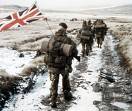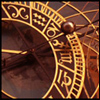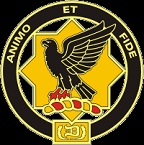IronDuke_slith
Posts: 1595
Joined: 6/30/2002
From: Manchester, UK
Status: offline

|
quote:
ORIGINAL: morvwilson
Just to try to interject a little sense here into this jumbled mess. The original discussion was on English war leaders on land over the last thousand years or so. Here is the list I see developing.
Edward the Elder (Uniter of England according to Anglo Saxon Cronicles)
Edward IV (Black Prince of Wales for Crecy)
Henry V (Agincourt)
Cromwell
John Churchill, 1st Duke of Marlborough (started as a Marine, may not qualify for this list, what do you think?)
Wellington
Moore
Beresford
Clive
Cornwallis
Wavell
Montgomery (Personally I still think Monty was overrated, too cautious, but since we seem to have a shortage of names...)
Slim
Winston Churchill (do you think this decendant of John Churchill qualifies?)
When I put up my first answer, I gave twelve names off the top of my head from a two hundred year history of the US. By contrast there should be at least sixty names here for 1000 years of English history. What am I missing?
A sense of perspective and reality on the American names? 
From the american point of view, many of the names so far listed strike me as strange.
Pershing? Arrived in France and promptly set about making the same mistakes everyone else had made, refusing to believe his allies (who had moved on theior techniques) had anything to teach him.
Patton? A man who was dynamite with an open road and a map in his hand, but who was somewhat less dangerous when asked to fight. His drive on the Bulge was not that impressive given it took him five days, he failed to really concentrate and his push was through a collection of Volks outfits if memory serves. He then arrives at Bastogne and has to fight for a further fortnight to clear the area. His campaign in Lorraine is a poor one, his raid on Hammelburg borderline criminal. Too many have been seduced by the pearl handled pistols and the soundbites. He was a Divisional or Corp Commander promoted one step too far.
Many of the American names were also subordinates. Longstreet and Jackson were at the sort of level that O'Connor or Dempsey were for the British and I think a lack of familiarity with that level of British command may be costing the British some names.
Of American Land Commanders, only Lee springs to mind as an operational Napoleonite, but a man who ultimately blundered. Grant reminds me of Montgomery in that he understood his limitations, those of his men, and knew what he had to do to win. That in many ways is the key question. Napoleon ultimately lost and by 1809-10 was perhaps largely shot (see his performances at Waterloo and Borodino). Grant ultimately won. Great Generals do not necessarily have to win, but one might argue that a Great Commander takes what he has, what he thinks he can do, and applies it to best effect. In which case, Monty and Grant have few peers.
I'm not familiar with the revolution (or First Civil War, however you want to phrase it  ) but my British list would entail the undefeated Wellington, who beat a succession of French Marshals before facing the great one himself and prevailing. I'd include Montgomery, because for all his personal faults, his strategy was probably the correct one, and it was a strategy he was ideally suited for. Slim would have to be included, and from the earlier period Marlborough and Wolfe. ) but my British list would entail the undefeated Wellington, who beat a succession of French Marshals before facing the great one himself and prevailing. I'd include Montgomery, because for all his personal faults, his strategy was probably the correct one, and it was a strategy he was ideally suited for. Slim would have to be included, and from the earlier period Marlborough and Wolfe.
I'd be tempted to include Cromwell because he understood the basic principles of war, not least that hard training and Command and control are exceptionally important. He also led from the front.
Of the English Kings, Henry V stands out, Edward I, Edward III who beat both the scots at Halidon Hill and the French at Crecy and Alfred the Great.
Part of the issue of finding more was that Britain has always been a sea power who generally paid others to take the risks on land. Our land fighting between 1815 and 1914, for example, was generally against natives of one description or another with the exception of the Crimea. This was a period of heavy fighting in America and Europe but we just don't get involved as much. After 1588, we generally produce excellent Admirals with just a few land Commanders where required.
For the US, I think Lee. He was the the closest thing to Napoleon (a frenchman who on his day was arguably the World's greatest Captain, only Hannibal I think could rank alongside). You produce a good crop of Corp and Divisional Commanders (Longstreet, Hancock, Jackson, Collins and others) but the American style of fighting has generally been very direct. I think this will produce fighters at Division and Corp level who will stand out, but fewer great operational minds in the Manstein or Napoleonic sense. Patton stands out because he liked to maneuver (whether he was good or not is a separate issue), not because he was typical of the American style of war. In this sense (and the British have been the same in the 20th century) you need less a man who is an inspired General and more an attentive Manager with an eye for detail.
Regards,
IronDuke
< Message edited by IronDuke -- 1/2/2007 1:46:32 AM >
_____________________________
|
 Printable Version
Printable Version














 ? Don't think so, neither was Genghis really (given all the times he lost battles), both had help from others...
? Don't think so, neither was Genghis really (given all the times he lost battles), both had help from others... 



 New Messages
New Messages No New Messages
No New Messages Hot Topic w/ New Messages
Hot Topic w/ New Messages Hot Topic w/o New Messages
Hot Topic w/o New Messages Locked w/ New Messages
Locked w/ New Messages Locked w/o New Messages
Locked w/o New Messages Post New Thread
Post New Thread